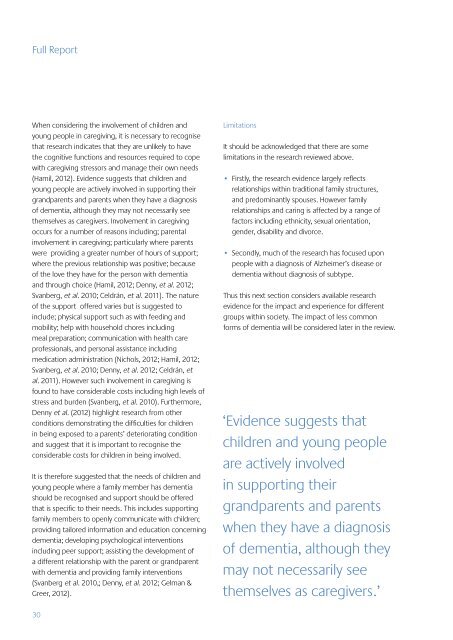The experiences needs and outcomes for carers of people with dementia
RSAS-ADS-Experiences-needs-outcomes-for-carers-of-people-with-dementia-Lit-review-2016
RSAS-ADS-Experiences-needs-outcomes-for-carers-of-people-with-dementia-Lit-review-2016
Create successful ePaper yourself
Turn your PDF publications into a flip-book with our unique Google optimized e-Paper software.
Full Report<br />
When considering the involvement <strong>of</strong> children <strong>and</strong><br />
young <strong>people</strong> in caregiving, it is necessary to recognise<br />
that research indicates that they are unlikely to have<br />
the cognitive functions <strong>and</strong> resources required to cope<br />
<strong>with</strong> caregiving stressors <strong>and</strong> manage their own <strong>needs</strong><br />
(Hamil, 2012). Evidence suggests that children <strong>and</strong><br />
young <strong>people</strong> are actively involved in supporting their<br />
gr<strong>and</strong>parents <strong>and</strong> parents when they have a diagnosis<br />
<strong>of</strong> <strong>dementia</strong>, although they may not necessarily see<br />
themselves as caregivers. Involvement in caregiving<br />
occurs <strong>for</strong> a number <strong>of</strong> reasons including; parental<br />
involvement in caregiving; particularly where parents<br />
were providing a greater number <strong>of</strong> hours <strong>of</strong> support;<br />
where the previous relationship was positive; because<br />
<strong>of</strong> the love they have <strong>for</strong> the person <strong>with</strong> <strong>dementia</strong><br />
<strong>and</strong> through choice (Hamil, 2012; Denny, et al. 2012;<br />
Svanberg, et al. 2010; Celdrán, et al. 2011). <strong>The</strong> nature<br />
<strong>of</strong> the support <strong>of</strong>fered varies but is suggested to<br />
include; physical support such as <strong>with</strong> feeding <strong>and</strong><br />
mobility; help <strong>with</strong> household chores including<br />
meal preparation; communication <strong>with</strong> health care<br />
pr<strong>of</strong>essionals, <strong>and</strong> personal assistance including<br />
medication administration (Nichols, 2012; Hamil, 2012;<br />
Svanberg, et al. 2010; Denny, et al. 2012; Celdrán, et<br />
al. 2011). However such involvement in caregiving is<br />
found to have considerable costs including high levels <strong>of</strong><br />
stress <strong>and</strong> burden (Svanberg, et al. 2010). Furthermore,<br />
Denny et al. (2012) highlight research from other<br />
conditions demonstrating the difficulties <strong>for</strong> children<br />
in being exposed to a parents’ deteriorating condition<br />
<strong>and</strong> suggest that it is important to recognise the<br />
considerable costs <strong>for</strong> children in being involved.<br />
It is there<strong>for</strong>e suggested that the <strong>needs</strong> <strong>of</strong> children <strong>and</strong><br />
young <strong>people</strong> where a family member has <strong>dementia</strong><br />
should be recognised <strong>and</strong> support should be <strong>of</strong>fered<br />
that is specific to their <strong>needs</strong>. This includes supporting<br />
family members to openly communicate <strong>with</strong> children;<br />
providing tailored in<strong>for</strong>mation <strong>and</strong> education concerning<br />
<strong>dementia</strong>; developing psychological interventions<br />
including peer support; assisting the development <strong>of</strong><br />
a different relationship <strong>with</strong> the parent or gr<strong>and</strong>parent<br />
<strong>with</strong> <strong>dementia</strong> <strong>and</strong> providing family interventions<br />
(Svanberg et al. 2010,; Denny, et al. 2012; Gelman &<br />
Greer, 2012).<br />
Limitations<br />
It should be acknowledged that there are some<br />
limitations in the research reviewed above.<br />
• Firstly, the research evidence largely reflects<br />
relationships <strong>with</strong>in traditional family structures,<br />
<strong>and</strong> predominantly spouses. However family<br />
relationships <strong>and</strong> caring is affected by a range <strong>of</strong><br />
factors including ethnicity, sexual orientation,<br />
gender, disability <strong>and</strong> divorce.<br />
• Secondly, much <strong>of</strong> the research has focused upon<br />
<strong>people</strong> <strong>with</strong> a diagnosis <strong>of</strong> Alzheimer’s disease or<br />
<strong>dementia</strong> <strong>with</strong>out diagnosis <strong>of</strong> subtype.<br />
Thus this next section considers available research<br />
evidence <strong>for</strong> the impact <strong>and</strong> experience <strong>for</strong> different<br />
groups <strong>with</strong>in society. <strong>The</strong> impact <strong>of</strong> less common<br />
<strong>for</strong>ms <strong>of</strong> <strong>dementia</strong> will be considered later in the review.<br />
‘Evidence suggests that<br />
children <strong>and</strong> young <strong>people</strong><br />
are actively involved<br />
in supporting their<br />
gr<strong>and</strong>parents <strong>and</strong> parents<br />
when they have a diagnosis<br />
<strong>of</strong> <strong>dementia</strong>, although they<br />
may not necessarily see<br />
themselves as caregivers.’<br />
30


